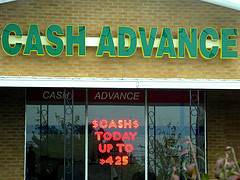How Payday Lenders Fought To Stay Legal In Missouri
The crusading investigative reporters over at ProPublica traced what happened to the 2012 attempt to put the issue in front of voters. There wasn’t much hope for a bill introduced in the state legislature: one of the leaders of the House Financial Institutions Committee actually owns a payday lender. A ballot initiative made more sense: put the question before the people who are actually paying those astronomical interest rates.
That’s when a mysterious group aiming to protect the right of people with bad credit to borrow money showed up on the scene. The group is called Missourians for Equal Credit Opportunity (MECO) and is very well-funded. The trail of clues led ProPublica to conclude that all of that money came from the payday lending industry. Gasp!
In order to get a ballot initiative before voters, you need signatures. Lots of signatures. Churches took charge of this, setting up on street corners and gathering signatures at events like lenten fish dinners. Religious leaders received a vaguely threatening letter from a Texas law firm warning them that being involved in politics could affect the tax-exempt status of their churches.
Then things got kind of evil. The group spent $800,000 gathering signatures for decoy ballot initiatives: actual initiatives that were proposed, but that don’t actually reform anything. One decoy initiative capped the interest rate of payday loans at 14%, unless the customer agreed to pay a higher rate and signed a contract. Such a law would be completely useless.
It wasn’t enough to just propose these initiatives: nope, MECO then dispatched signature gatherers to compete with the pro-reform coalition’s signature gatherers. If someone had already signed a petition for a decoy initiative, they assumed that it was the same thing. A person can’t sign the same petition twice, after all.
MECO also filed lawsuits against the ballot initiative. One local court sided with the group, but supporters of the reform initiative kept gathering signatures while the decision was appealed to the state supreme court. MECO sent employees out to these signature drives to “warn” people that the initiative had been found illegal.
Rate-cap opponents also went out to signature drives and blocked voters from approaching the real petition gatherers. They filed suit, seeking a restraining order to keep their opponents away, but the court decided that the MECO-funded “blockers” were well within their First Amendment rights to harass signature-gatherers.
In the end, the ballot initiative failed. They needed the signatures of 5% of the eligible voters in each of the state’s Congressional districts. They plan to try again in 2014, and the lending industry will surely be ready.
The Payday Playbook: How High Cost Lenders Fight to Stay Legal [ProPublica]
Want more consumer news? Visit our parent organization, Consumer Reports, for the latest on scams, recalls, and other consumer issues.


